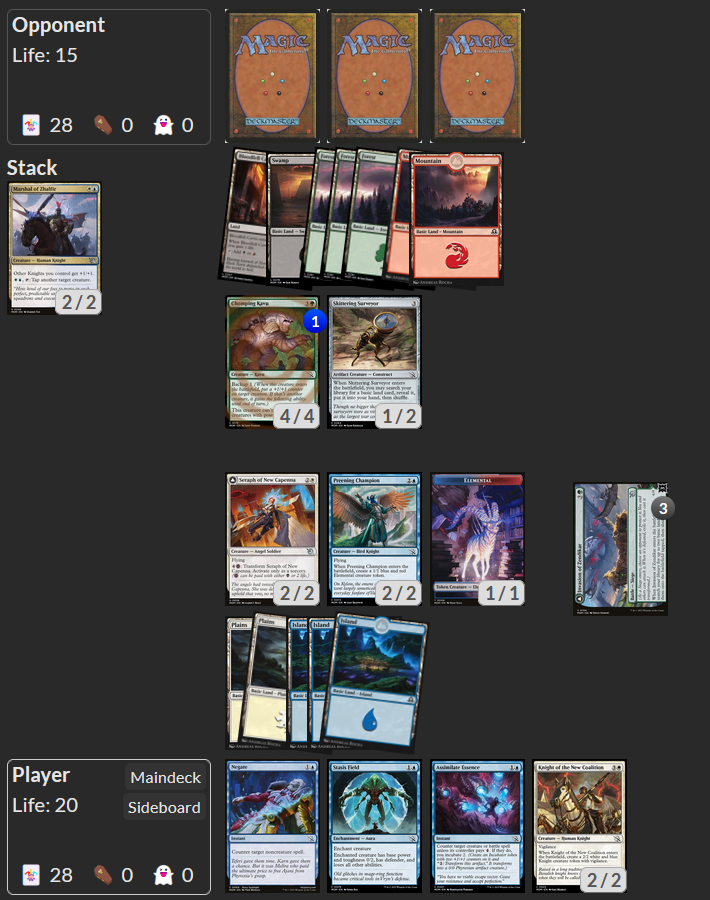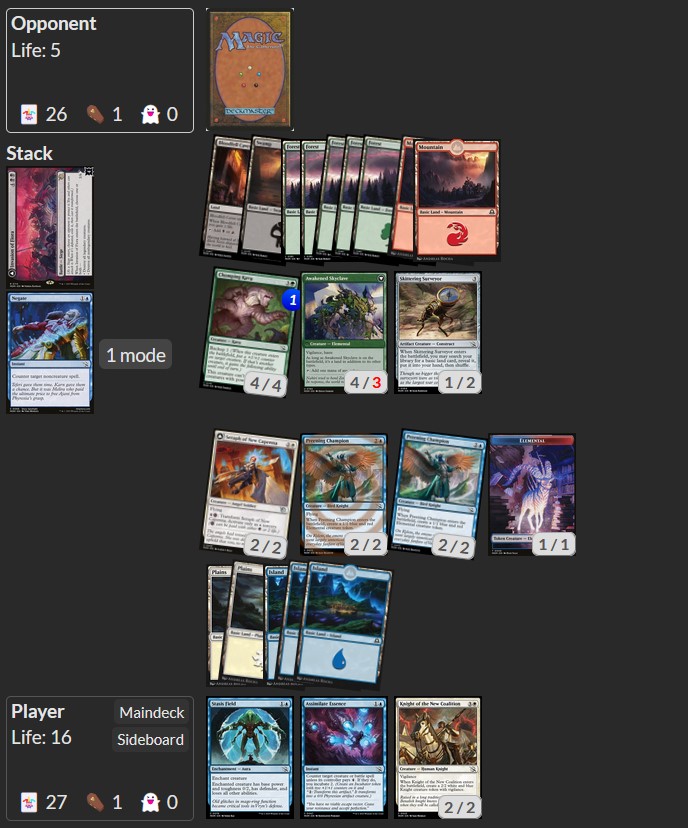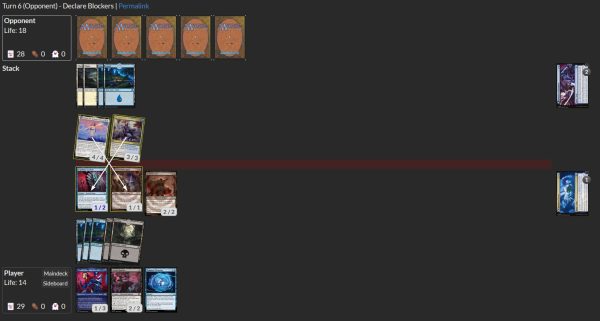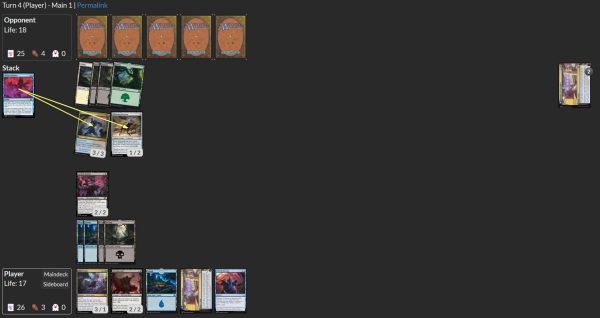Are you a Quiet Speculation member?
If not, now is a perfect time to join up! Our powerful tools, breaking-news analysis, and exclusive Discord channel will make sure you stay up to date and ahead of the curve.
I've dedicated most of my content for QS over the years to topics related to Magic finance. It's no surprise—given the focus of this website when I first started writing here—and my own mindset when approaching the game. When I engage with this hobby, card values, pricing fluctuations, reprints, the Reserved List, and a myriad of similar things are always on my mind.
One subject I’ve virtually never written about though, is one of my favorite ways to actually play Magic: Limited (Draft, in particular).
That changes today! After a bumpy start, I've grown to enjoy March of the Machine Draft. Through a little practice, some podcast listening, and a deliberate desire to win more games, I’ve slowly improved my MOM Draft performance.

This week, I wanted to touch on a few changes I’ve made to my strategy/thought process, harvesting my 17lands.com play data to showcase a couple of board-state examples. These changes helped me go from multiple dismal Draft performances to trophying in Platinum.
Let Your Counterspells Be Good
I’ve seen all sorts of Counterspell variants in Limited over the years. Some are particularly strong in their respective formats like Make Disappear in Streets of New Capenna (SNC), and now Artistic Refusal in MOM. In other formats like The Brothers' War (BRO), counterspells were more lukewarm in power. No matter the format, an unexpected counterspell used at the right time can be backbreaking in a best-of-one game. Up until recently, the part I struggled with was figuring out when was “the right time.”
In some cases, I would tap out too frequently, leaving myself vulnerable to opposing bombs while sitting there with an uncastable counter in my hand. This is especially important in formats like March of the Machine with its numerous bombs. Holding a counterspell and being unable to cast it on my opponent’s Boon-Bringer Valkyrie or Sunfall is one of the biggest mistakes I’ve made in this format.
Here’s the deck I trophied with recently, jamming a basic UW Knights build with very little as far as bombs go. Lurrus of the Dream-Den was more powerful for what it threatened to do, rather than anything it actually did in my games.
MOM Draft UW Knights
Because my deck was so low-to-the-ground, I often found myself slightly ahead in the early turns. Once I had even the slightest edge, I deliberately left up two mana for my Assimilate Essence and Negate to protect my advantage. Being selective in what I countered and didn’t counter, allowed me to maximize the power of these cards.
An Aside on Negate
This was the first time I included Negate in my deck and it was an absolute all-star.
The reason Negate was so instrumental to this deck’s success is twofold. First, I believe this format has enough powerful non-creature cards to merit main decking. Between battles, convoking combat tricks, powerful removal spells, card draw spells, etc., having a Negate in hand gives a warm and fuzzy feeling throughout the game.
Second, I had ample creatures to gum up the board. I wasn’t as concerned with most creatures my opponents could put into play. If my opponent did have a creature bomb, I had the two Assimilate Essence to hopefully counter them. The non-creature spells were what concerned me most, and that’s where Negate came into play.
In one game, I was pressing an advantage in the air when my opponent put Kitesail on the stack. I negated the spell and proceeded to win with flying creatures.
My favorite play, however, came in my fifth game against BG. I had the chance to add to my board presence and cast Stasis Field to hinder my opponent and press my advantage. Instead, I held up Negate as a precaution.

It didn’t pay out immediately, but just two turns later I was handsomely rewarded for my clever play.
My opponent cast an end-of-turn Vanquish the Weak on my Marshal of Zhalfir and I nearly countered it. I reminded myself that, while the Marshal was pumping some of my team, it wasn’t the reason I was winning the game. My flying creatures were the key to victory. I let the removal spell resolve.
When my opponent untapped, attacked, and slammed their bomb: Invasion of Fiora // Marchesa, Resolute Monarch! I was ready with the counter. Game over.

Have a Strategy and Stick to It
I tend to get a little trigger-happy in Limited games of Magic. If I have a removal spell, I tend to fire it off on the first juicy target I see. I cast combat tricks as soon as I have the chance to generate a favorable attack. As I mentioned before, I tend to cast my countermagic as soon as I have a viable target.
I’m convinced these behaviors have been a detriment to my win rate. Recently, I've tried making improvements in my decision process.
The example above is one case where I exercised some discipline and saved my interactive spells for the truly problematic cards—cards I wouldn’t be able to deal with otherwise.
I was able to identify exactly what cards I needed to worry about because I had developed a strategy for my deck, and then stuck to it. In the case of this UW deck, I knew flying creatures, partnered with some strategically cast counterspells, were my primary method of winning. Therefore, I maintained the discipline to worry less about cards my opponents cast that didn’t hinder my goals.
My most recent deck is a well-tuned UB build with two copies of Invasion of Amonkhet and one Invasion of Kamigawa. I don’t have any rare bombs, but I did manage to draft two copies of Grafted Butcher. Here’s the list:
MOM Bo1 Draft UB 7-0
My primary strategy for this deck is leveraging unblockable abilities in Tetsuko Umezawa, Fugitive and Expedition Lookout to flip my powerful battles, generate card advantage, and eventually push through lethal damage. The list is light on removal, so I’m leaning pretty heavily on the two Temporal Cleansing and Wicked Slumber to provide sufficient tempo against my opponent to further the battle-flipping goal.
In one game I had with this deck, I made multiple tough blocking decisions in early turns in order to achieve my goals. I knew that if I could get this game to go into double-digit turns, I’d be able to turn my battles into card advantage. As a result, I made some necessary chump-blocking decisions to keep things from running away from me.

While this block looked clunky, I knew I’d soon be flipping my own battle and harnessing some card advantage shortly thereafter. I also had a disruption spell in Temporal Cleansing should I need to buy more time.
The game remained close until the end, but a blunder on my opponent’s behalf led to their ultimate defeat.
Slowing Down The Pace of Play
The last strategy I’ve begun implementing is more about general play style than a Magic-specific idea. For the most part, I’ve done my best to slow my pace of play in order to allow myself more time to think through my decisions.
There’s no reward for playing as quickly as possible. I'll admit that often, my first inclination isn’t the best in-game decision. By deliberately slowing my pace, I’ve allowed myself more time to think through components of a decision that I historically would not have considered.
For example, I’ve begun thinking through what my opponents could have in their hands as far as interaction goes. Do they have that Ephara's Dispersal in hand? Will I mind if they do use the bounce spell on my creature? Could they have Cut Short? Should I play around that?
I’ve also given myself more time to plan my reactions to opponent decisions. This is showcased in my Negate example, where I thoroughly scrutinized the impact my opponent’s play would have on the game before choosing to respond. If an opponent puts a spell on the stack that is more annoying than problematic, I’m more inclined to let it resolve—especially if I have sufficient power in my hand to respond on a subsequent turn.
This brings me to another benefit of slowing down: improving my ability to plan multiple turns out. Instead of just firing off the best creature in my hand each turn, I have chosen to hold certain resources back when I need to keep up the option to interact. This format is slow enough that holding up countermagic or other interactive spells (thereby not maximizing your mana each turn) isn’t overly punishing. By recognizing this, I’ve been able to make wiser decisions throughout my games.
In the example below, I recognized that an aggressive use of Wicked Slumber meant I could flip my Invasion of Amonkhet on turn four, leading to a 5/5 flying Oculus Whelp for my opponent to deal with.

It turns out they did have a way to deal with the creature, but not until after I cast the second Invasion of Amonkhet and flipped it into a second 5/5 flying Oculus Whelp. By then it was too much for my opponent. My plan had been successfully enacted, leading to victory.
Wrapping It Up
I don’t claim to be a top-tier Limited player—far from it. I do love the format though, and I try to spend my gold and gems on drafts whenever I have enough to spend.
Unfortunately, I quickly ran out of said resources this month when I recklessly barged into a couple of drafts, ill-prepared. I don’t think I was drafting bad decks—rather, I suspect my gameplay needed some desperate sharpening. After listening to more Limited podcasts (I enjoy Lords of Limited and Limited Resources in particular), and deliberately transforming my gameplay, I started seeing more success.
Some of these strategic decisions may be obvious to a season Limited player. To a newer player, or to an experienced player who is struggling, these actions may prove highly beneficial. For me, learning the strength of countermagic, learning how to maximize these interactive spells (including Negate), knowing my strategy up front, and making gameplay decisions that align specifically with this strategy have all led me to an increased win rate.
Perhaps the overarching theme around it all is simply my decision to slow down my pace of play and think more carefully about my in-game decisions. It’s this move to a more deliberate play style that could be boosting my win rate most of all.





